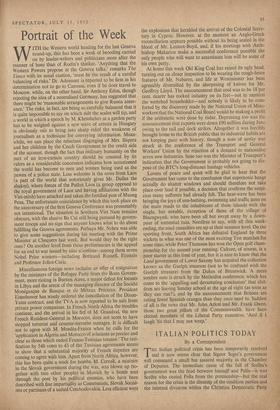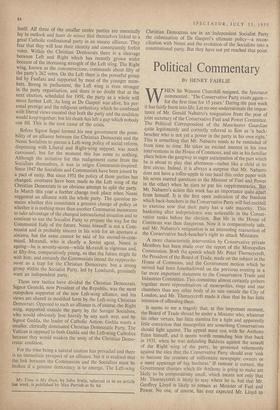ITALIAN POLITICS TODAY
By a Correspondent lHE Italian political crisis has been temporarily resolved and it now seems clear that Signor Segni's government will command a small but assured majority in the Chamber of Deputies. The immediate cause of the fall of Scelba's government was the feud between himself and Pella--it was Scelba who ousted Pella from the premiership—but the real reason for the crisis is the disunity of the coalition parties and the internal divisions within the Christian Democratic Party itself. All three of the smaller centre parties are essentially lay in outlook and faute de mieux find themselves linked to a great Catholic confessional party in an uneasy alliance. They fear that they will lose their identity and consequently forfeit votes. Within the Christian Deniocrats there is a cleavage between Left and Right which has recently grown wider because of the increasing strength of the Left wing. The Right wing, known as the concentrazione, commands about fifty of the party's 262 votes. On the Left there is the powerful group led by Fanfani and supported by most of the younger mem- bers. Strong in parliament, the Left wing is even stronger in the party organisation, and there is no doubt that at the next election, scheduled for 1958, the party as a whole will move farther Left. As long as De Gasperi was alive, his per- sonal prestige and the religious orthodoxy which he combined with liberal views ensured that both the party and the coalition would keep together; but his death has left a gap which nobody can fill. This is the root cause of the crisis.
Before Signor Segni formed his new government the possi- bility of an alliance between the Christian Democrats and the Nenni Socialists to pursue a Left-wing policy of social reform, dispensing with Liberal and Right-wing support, was much canvassed; but for the moment this has come to nothing. Although the initiative for this realignment came from the Socialists themselves, it was in origin Communist-inspired. Since 1947 the Socialists and Communists have been joined by a pact of unity. But since 1951 the policy of these parties has changed; overtures have been made to the Left wing of the Christian Democrats in an obvious attempt to split the party. In March this year a further change took place when Nenni suggested an alliance with the whole party. The question re- mains whether this constitutes a genuine change of policy or whether it is nothing more than another Communist manoeuvre to take advantage of the changed international situation and to continue to use the Socialist Party to prepare the way for the Communist Italy of the future. Nenni himself is not a Com- munist and is probably sincere in his wish for an apertura a sinistra, but the same .cannot be said of his second-in-com- mand, Morandi, who is clearly a Soviet agent, Nenni is ageing—he is ,seventy-seven—while Morandi is vigorous and, at fifty-five, comparatively young, so that the future might lie with him; and certainly the Communists intend the rapproche- ment as a trap for the Christian Democrats; but, a strong group Oithin the Socialist Party, led by Lombardi, genuinely want an independent party.
These new tactics have divided the Christian Democrats. Signor Gronchi, now President of the Republic, was the most outspoken supporter of the new Left-wing alliance, and his views are shared in modified form by the Left-wing. Christian Democrats. Opposed to such an alliance is, of course, the Right wing, supported outside the party by the Saragat Socialists, who would obviously lose heavily by any such step, and by Signor Gedda, the leader of Catholic Action. Gedda wants a smaller, clerically dominated Christian Democratic Party. The Vatican is opposed to both Gedda and the Left-wing Catholics. because they would weaken the unity of the Christian Demo- cratic coalition.
For the time being a natural caution has prevailed and there is no immediate prospect of an alliance, but it is realised that the link between the Communists and the Socialists must be broken if a genuine democracy is to emerge. The Left-wing Christian Democrats see in an 'independent Socialist Party the culmination of De Gasperi's ultimate policy—a recon- ciliation with Nenni and the evolution of the Socialists into a constitutional party. But they have not yet reached that point.



































 Previous page
Previous page